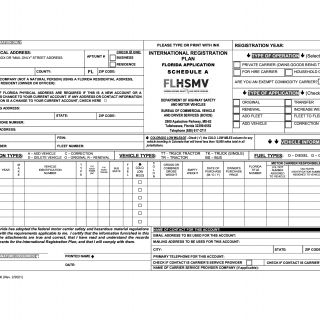Form HSMV 85900. International Registration Plan, Florida Application
Form HSMV 85900 is the Florida Application for International Registration Plan (IRP), which is used to apply for commercial vehicle registration and licensing in multiple states or provinces.
The main purpose of the IRP is to simplify the registration process for commercial vehicles that travel across state or provincial lines, by allowing them to register with a single base jurisdiction rather than obtaining separate registrations in each jurisdiction they operate in.
The form consists of several parts, including identifying information about the registrant and their business, a description of the registered vehicles, and the jurisdictions where they will be operating. Important fields include the type of vehicles being registered, the gross vehicle weight rating, and the number of miles traveled in each jurisdiction.
Parties involved in the form include the registrant and the various jurisdictions where the vehicles will be operating.
When filling out the form, it's important to provide accurate and complete information about the registered vehicles and the jurisdictions where they will be operating. This may include detailed descriptions of the vehicles, as well as documentation such as titles, bills of sale, or lease agreements.
Additionally, documents such as proof of insurance, safety inspections, and tax clearance certificates may need to be attached to the application.
Examples of scenarios where the form may be required include companies that operate commercial vehicles such as trucks, buses, or trailers across state or provincial lines. The IRP allows these businesses to streamline their registration processes and avoid having to obtain multiple registrations, making it easier to operate across different jurisdictions.
Strengths of the IRP and the associated Form HSMV 85900 include the ability to simplify the registration process for commercial vehicles that operate across multiple jurisdictions, reducing administrative burden and costs. Weaknesses may include potential errors or omissions in the registration process, as well as inefficiencies in the handling of the application by different jurisdictions.
Alternative forms or analogues to the IRP may include other programs and agreements that facilitate the registration and licensing of commercial vehicles across multiple jurisdictions, such as the North American Free Trade Agreement (NAFTA) or the Unified Carrier Registration (UCR) program. Differences may include variations in eligibility requirements, fees, or reporting procedures.
Submitting and storing the IRP application will depend on the specific requirements of each jurisdiction where the vehicles will be operating. The completed form and any attached documents may need to be submitted electronically or in paper form, and will likely be stored securely by each jurisdiction to track and monitor the registered vehicles.
Overall, the IRP and Form HSMV 85900 play an important role in helping businesses manage their commercial vehicle fleets, by simplifying the registration process and reducing administrative burden. By facilitating communication and cooperation between different jurisdictions, it can help streamline operations and improve efficiency for businesses that operate across state or provincial lines.

